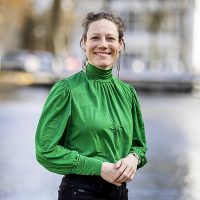New Delta-lab for water and subsurface solutions
With the new Delta-lab, the research of knowledge institute Deltares on water and subsurface systems gets a major boost. The Delta-lab in Delft brings together applied experimental research, integrated expertise and the latest technology in a high-quality building. Knowledge from this lab contributes to society's growing demand for a healthy living environment.

In the Delta-lab, Deltares researchers take a close look at the subsurface and (ground)water. Much of this work consists of research into the extent and behaviour of various pollutants and how ecosystems respond to them. Think of man-made substances like PFAS, biological pathogens, nutrients like nitrate and organic substances of very high concern.
We also look at what is present in water and subsurface itself, such as micro-organisms. In the Delta-lab, we look for ways to influence and manage these substances and micro-organisms, and for solutions. In addition, our lab develops knowledge that contributes to accelerating the energy transition and to future-proof infrastructure. Such as what effects geothermy or aquathermy have on the subsurface, groundwater or surface water, or how to prevent bacterial corrosion of sheet piling or wind turbines at sea.
Moreover, the lab technicians investigate the reusability of treated soil, sludge or dredging: can it be used as a building material for our dykes or for other societal tasks? And what is possible regarding the storage and emission of greenhouse gases in water and subsurface?

Unique data
The Delta-lab can provide unique data by combining knowledge of chemistry, microbiology, sediment, soil science and hydrology. This data is tested and further developed in Deltares' physical and digital knowledge facilities, such as wave casts or models, and used by other knowledge institutions or policymakers. This brings solutions to complex societal questions about subsurface and groundwater closer. Sometimes findings from the lab enable pilots in the field, making the lab a bridge between academic research and practice.
There is a growing awareness that our natural resources are too precious not to handle them extremely carefully. That's why in the Delta-lab we combine all the knowledge around our soil, water and sediment system, so that we can answer increasingly difficult social questions.
Fredericke Hannes, head of Delta lab
Relocation from Utrecht
Because of the demands of applied experimental research on a laboratory, and to encourage more cooperation between research facilities, Deltares decided to move the lab to Delft. Before that, the lab was located in a university building on Utrecht's Princetonlaan.
In cooperation with PM2, Wiegerinck and builder De Vries en Verburg, a flexible laboratory building was realised on the Deltares campus in Delft. Wouter de Haan, head of Facilities Management at Deltares: ‘It has been designed in such a way that it can easily facilitate new functions and other layouts if necessary. In addition, the new lab is connected to an existing office building on the campus. Using traffic space and workstations in that building created more space for the lab functions.’



